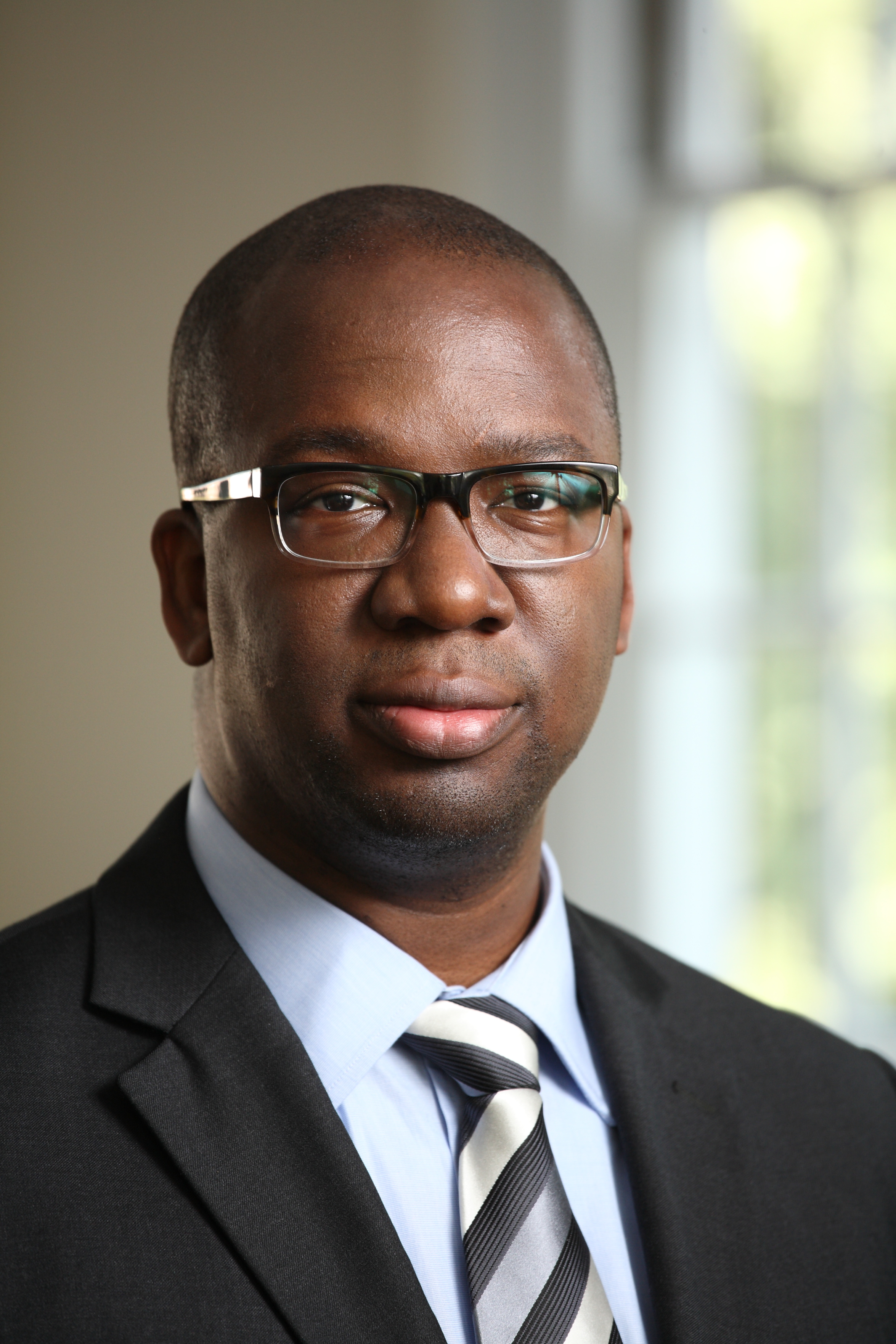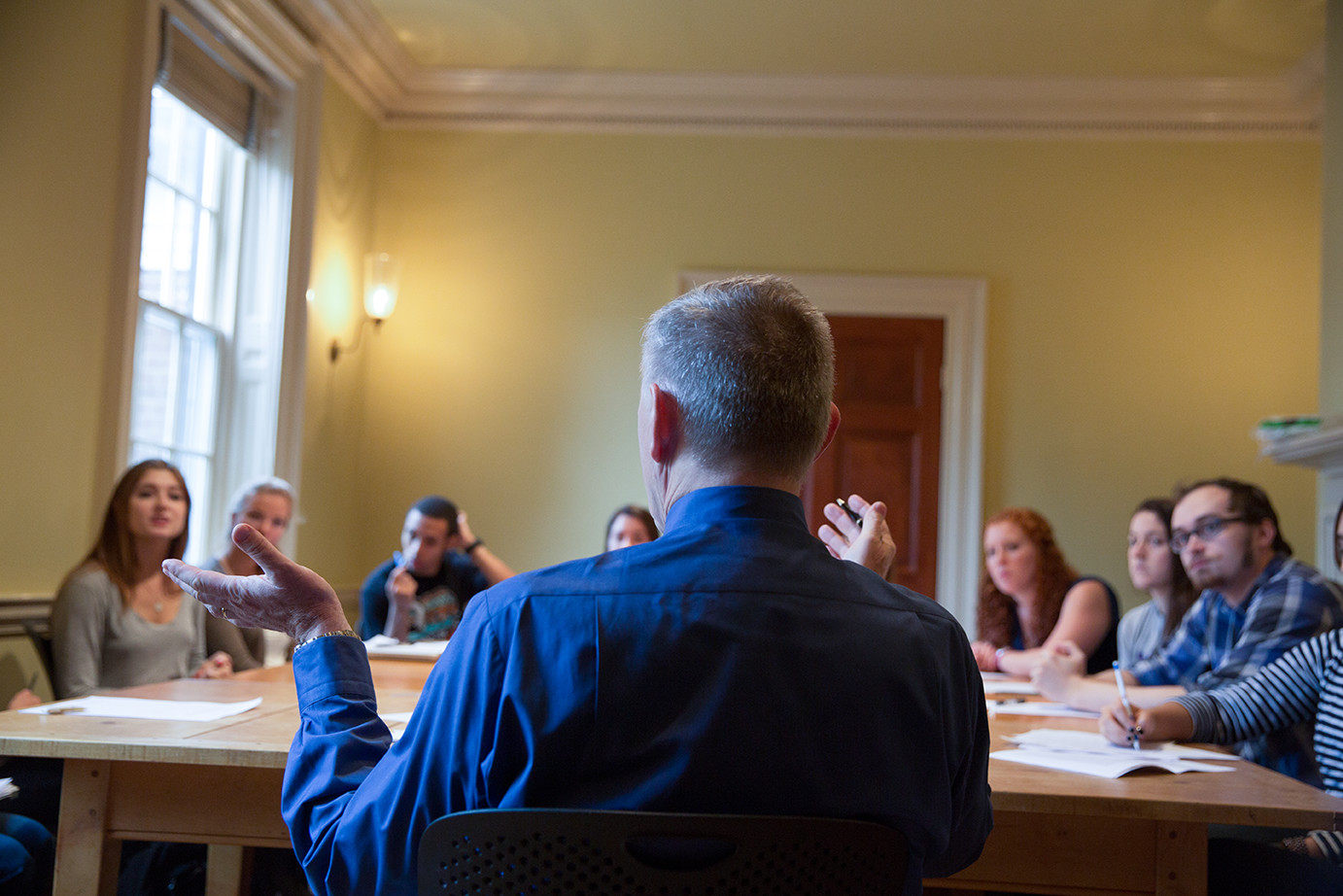“The list of decisions engineers make that affect how we live is endless,” said Tolu Odumosu, an assistant professor in the University of Virginia’s Engineering and Society Department.
How do engineering students learn to see not only the big picture, but also consider the chain of possible consequences? Odumosu is sparking his students’ interest in these consequences in his seminars, “Engineering Society?” and “The Engineer, Ethics and Professional Responsibility,” using the latest evidence-based teaching methods he learned through “Ignite: Launching the Next Generation of UVA Faculty for Teaching Excellence.”
“Ignite,” a pilot program of UVA’s Center for Teaching Excellence, gives new instructors the support and resources they need to be effective in their classrooms right from the start.

UVA assistant engineering professor Tolu Odumosu said the “Ignite” teaching program has improved student participation and learning.
Odumosu designed an innovative syllabus with a learner-centered approach that emphasizes more collaborative and creative work, rather than the traditional scenario of students being passive receivers and regurgitators of the knowledge handed down from the professor. The learner-centered approach also encourages students to be more reflective about what they’re learning.
Odumosu also gives his students imaginative assignments that enable them to show the critical skills they’ve mastered, such as analyzing an academic paper about engineers in society the way a film reviewer would break down scenes from a movie to show the director’s/engineer’s motivation and purpose.
So far, he can tell the difference in his students’ participation, Odumosu said enthusiastically.
New faculty members will reach thousands of students throughout their careers, said Dorothe Bach, associate director of the Center for Teaching Excellence.
As the University undergoes an unprecedented generational turnover in faculty, this program “presents a unique opportunity to invest in the next generation of faculty,” Bach said, “to help acculturate them to UVA’s core value of educational excellence, to give them the skills to be effective and innovative teachers, and to support them as they strive to help their students learn in our increasingly global world.
“The Center for Teaching Excellence has created – in collaboration with and under the leadership of the Provost’s Office – a comprehensive, yearlong program to prepare incoming faculty for the type of effective and innovative teaching needed to sustain and strengthen UVA’s outstanding residential education.”
Graduate students earning their Ph.D.s and headed for academia do not typically get specific training in classroom teaching, Bach said, even though they’ll be expected to teach in their subsequent college and university jobs. UVA is one of the leaders among universities working to change that predicament and give budding instructors the tools they need to be successful.
The Ignite program began with seed funding from the UVA Alumni Association’s Jefferson Trust. The original plan was to begin with a small pilot of 12 faculty. Because of the large interest and need, however, this number has tripled and the program currently serves 35 faculty members in this inaugural year.
In the summer, the group attended the center’s nationally recognized Course Design Institute, which has produced its own research on successful methods, as well as incorporating the latest research in the teaching profession. During the five-day, intensive workshop, novice professors learned about student motivation, active learning and better ways of assessing learning, plus how to involve students in activities that result in long-term, transformative learning.
Research on student perceptions of “learning-focused” syllabi – such as those created by faculty during the Course Design Institute – recently received the top award from the Professional & Organizational Development Network in Higher Education.
“Colleagues at other schools, and even internationally, have asked us to visit and give training workshops,” Bach said. “We have data that show that our intervention changes the way faculty conceive of their work with students.”
The Ignite faculty members also went to a retreat just before classes started this semester and are employing a variety of instructional technologies designed to enhance learning.
Through the academic year, participants meet monthly in small groups with center faculty to successfully implement their learning-focused courses and build supportive peer networks. In subsequent years, they have the option of working with a mentor from the University Academy of Teaching to further refine their teaching skills.
“It is great to have a community of like-minded faculty,” Odumosu said. “They push me, encourage me and give me an outlet to discuss teaching and pedagogy. Also, Michael Palmer [an associate professor of chemistry and the center’s managing director] is always teaching us new things from the teaching literature. The meetings are wonderful.”
Natasha Heny, an assistant professor in the Curry School of Education’s Curriculum, Instruction and Special Education Department since 2013, said her small Ignite group is giving her a broader understanding of how classes are taught in different UVA schools and departments. Having the group to interact with lessens the sense of isolation a teacher can sometimes feel, she said.
The Ignite teaching program sets up faculty participants “for success in every way.” - Assistant Professor of Education Natasha Heny
Heny teaches future English teachers working on their master’s degrees and has seen them take some of the methods she’s using into their student-teaching classes in secondary schools.
“They are more critical of their practices and reflect on what they’re doing,” Heny said. She and her students have learned more about balancing the learning of the individual with learning in a group. Having increased group interaction through a course blog, for instance, Heny found out the students wanted to hear more about each other’s classroom experiences.
Next year, she’d like to set up a new teachers’ group modeled on the Ignite format for those who will be working in their first “real” jobs, no matter where they are. She wants to provide a similar comfortable, stable network like the one she has found in Ignite.
The Center for Teaching Excellence’s full-time faculty members – Bach, Palmer, Marva Barnett and Matt Trevett-Smith – are themselves models, Heny said, and that’s something she respects a lot.
“They practice what they preach. They’re caring and available,” she said. The Ignite program sets up faculty participants “for success in every way,” she said.
“By encouraging pedagogical excellence and creativity,” Bach said, “UVA will strengthen its position as a leader in innovative education and further distinguish itself as a preeminent global institution of higher learning.”
Media Contact
Article Information
November 12, 2015
/content/ignite-program-lights-fire-passionate-teaching

